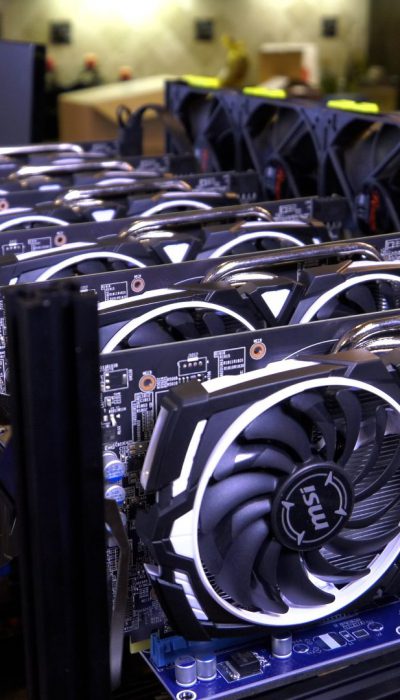
Secure Bitcoin Lending
In recent years, the popularity of Bitcoin lending has surged, with an estimated $6 billion worth of cryptocurrency being lent out globally. As this digital asset gains traction, investors are seeking secure lending options to maximize their returns while ensuring the safety of their funds. This article explores the intricacies of secure Bitcoin lending, delving into the risks, mechanics, and future trends of this burgeoning industry. By understanding the technicalities and legal implications, readers can make informed decisions about participating in the world of secure Bitcoin lending. Key Takeaways Bitcoin lending platforms offer convenience and profitability for both borrowers and lenders. Risk assessment strategies and loan diversification are essential to mitigate potential losses and improve stability in the lending industry. Proactive measures such as stringent borrower evaluation, regular monitoring of loan performance, and collateral requirements help prevent defaults and ensure a secure lending ecosystem. When choosing a bitcoin lending platform, thorough research, robust security measures, and responsive customer support are crucial to ensure reliability and customer satisfaction. The Basics of Bitcoin Lending Bitcoin lending involves the provision of loans using cryptocurrency as collateral. This innovative financial practice is gaining popularity due to the growing demand for digital assets and the increasing adoption of blockchain technology. Bitcoin lending platforms have emerged as a secure and efficient way for individuals and businesses to borrow and lend cryptocurrencies. These platforms provide a marketplace where borrowers can secure loans by leveraging their bitcoin holdings, while lenders can earn interest by lending their bitcoins to borrowers. The benefits of bitcoin lending are numerous. Firstly, it allows individuals to access funds without selling their bitcoin holdings, enabling them to maintain their exposure to potential price appreciation. Secondly, lenders can earn attractive yields by lending their bitcoins, providing them with an alternative investment opportunity in the digital asset space. Overall, bitcoin lending platforms offer a convenient and profitable solution for both borrowers and lenders in the crypto ecosystem. Understanding the Risks of Unsecured Lending Understanding the risks of unsecured lending is essential for any investor or lender. Unsecured lending refers to loans that are not backed by collateral, which means there is a higher degree of risk involved. It is crucial to evaluate the potential dangers, develop risk assessment strategies, and implement measures to protect against default to mitigate the inherent risks associated with unsecured lending. Unsecured Lending Dangers Unsecured lending can expose borrowers to significant risks and potential financial losses due to the absence of collateral. Without any form of security, lenders are left vulnerable to borrower default and are at risk of losing their investment. This is particularly concerning in the context of unsecured lending in the cryptocurrency industry, where the volatile nature of digital assets adds an additional layer of uncertainty. To further illustrate the dangers of unsecured lending, the following table provides a snapshot of potential risks and borrower default mitigation strategies: Unsecured Lending Risks Borrower Default Mitigation Market volatility Creditworthiness assessment Regulatory risks Collateral requirements Counterparty default Loan monitoring Operational challenges Debt collection process Lack of legal protections Penalty clauses Understanding these risks is crucial for lenders to adopt effective risk assessment strategies, which will be discussed in the subsequent section. By carefully evaluating and mitigating these risks, lenders can protect their investments and maximize their chances of success in the world of unsecured lending. Risk Assessment Strategies A comprehensive risk assessment strategy is essential for lenders to effectively evaluate potential risks and make informed decisions in the lending industry. In the world of secure bitcoin lending, where borrowers put up their cryptocurrency as collateral for loans, risk management becomes even more crucial. Lenders must carefully assess the creditworthiness of borrowers and evaluate the volatility and liquidity of the collateral being used. Additionally, loan diversification is a key aspect of risk management in this industry. Lenders should not rely on a single borrower or collateral, but rather spread their lending across multiple borrowers and different types of collateral. This diversification helps mitigate the impact of any default and reduces the overall risk exposure. By implementing robust risk assessment strategies and loan diversification techniques, lenders can protect themselves against potential losses and improve the overall stability of the lending industry. Protecting Against Default To safeguard against default, lenders must establish stringent criteria for evaluating the creditworthiness of borrowers and diligently monitor the performance of loans throughout their duration. Managing default risk is essential to protect the lender’s investment and maintain the stability of the lending platform. Lenders typically evaluate the borrower’s credit history, income, and financial stability to assess their ability to repay the loan. Borrower default prevention involves implementing measures such as collateral requirements, loan-to-value ratios, and regular loan servicing to minimize the risk of default. By continuously monitoring borrower performance and promptly addressing any signs of financial distress, lenders can take proactive measures to mitigate default risk. These measures ensure that both lenders and borrowers can participate in secure bitcoin lending with confidence, fostering a thriving lending ecosystem. Transitioning into the subsequent section about how secure bitcoin lending works, let’s explore the mechanisms that enable lenders and borrowers to engage in this innovative form of lending. How Secure Bitcoin Lending Works Bitcoin lending works by utilizing blockchain technology to ensure secure transactions and protect the interests of both lenders and borrowers. Through the use of smart contracts, lenders can securely lend their bitcoins to borrowers, who can then use the funds for various purposes. Risk management is an important aspect of secure bitcoin lending, and platforms often implement measures such as collateral requirements and credit checks to minimize the risk of default. Borrower verification is another crucial step in the lending process, which involves verifying the borrower’s identity and creditworthiness. By incorporating these risk management and verification measures, bitcoin lending platforms aim to create a secure environment for lenders to lend their bitcoins and for borrowers to access much-needed funds. In the subsequent section, we will discuss the importance of choosing a trusted bitcoin lending platform to ensure a secure lending experience. Choosing a Trusted Bitcoin Lending Platform When it comes to choosing a trusted Bitcoin lending platform, thorough research is essential. One should consider the security measures implemented by the platform, such as multi-factor authentication and cold storage of funds. Additionally, user reviews and ratings can provide valuable insights into the platform’s reliability and customer satisfaction. Platform Security Measures Platform Security Measures are crucial in ensuring the safety and protection of user funds and personal information. In the realm of secure Bitcoin lending, risk management plays a pivotal role. Robust security protocols should be implemented by lending platforms to mitigate potential risks associated with hacking, fraud, and data breaches. These measures can include multi-factor authentication, encryption of sensitive data, regular security audits, and cold storage of funds. Additionally, customer support plays a vital role in platform security. Responsive and knowledgeable customer support teams can address user concerns promptly, helping to prevent potential security breaches and ensuring a seamless user experience. By prioritizing platform security measures and providing excellent customer support, Bitcoin lending platforms can instill confidence in their users and foster a trustworthy environment for the freedom-seeking audience. User Reviews and Ratings User reviews and ratings serve as valuable feedback for potential users, providing insights into the experience and reputation of the lending platform. These reviews often touch upon important aspects such as user privacy and borrower verification, which are crucial for individuals seeking secure bitcoin lending services. User privacy is a key concern in the cryptocurrency world, as it involves the protection of personal information and financial transactions from unauthorized access. Borrower verification ensures that the platform verifies the identity and creditworthiness of borrowers, reducing the risk of fraudulent activity. By analyzing user reviews and ratings, potential users can assess how well a lending platform addresses these concerns, helping them make informed decisions about the security and reliability of the platform. Transitioning into the subsequent section about assessing the security measures of bitcoin lenders, it is crucial to evaluate these aspects alongside other security features to ensure a comprehensive understanding of the platform’s safety measures. Assessing the Security Measures of Bitcoin Lenders It is crucial to evaluate the security protocols implemented by bitcoin lenders to ensure the protection of borrowers’ assets. Evaluating borrower identity verification and implementing multi-factor authentication are two key aspects that contribute to the overall security of a bitcoin lending platform. By thoroughly assessing these measures, borrowers can have peace of mind knowing their assets are well-protected. One way to evaluate borrower identity verification is by assessing the documentation required during the onboarding process. A robust verification process should include the collection of government-issued identification, proof of address, and potentially additional documents to establish the borrower’s identity. In addition to borrower identity verification, implementing multi-factor authentication adds an extra layer of security. This can include a combination of something the borrower knows (such as a password), something the borrower has (such as a mobile device), and something the borrower is (such as biometric data). By requiring multiple factors for authentication, the risk of unauthorized access to borrower accounts is significantly reduced. To summarize, assessing the security measures of bitcoin lenders, including borrower identity verification and multi-factor authentication, is essential in safeguarding borrowers’ assets and ensuring a secure lending experience. Security Measure Evaluation Criteria Result Borrower Identity Verification Collection of government-issued identification, proof of address, and additional documents Robust Multi-Factor Authentication Combination of password, mobile device, and biometric data Strong Best Practices for Secure Bitcoin Lending When it comes to protecting borrowers’ assets, implementing robust authentication measures and conducting thorough due diligence are crucial for ensuring the safety of the lending process. In the realm of secure Bitcoin lending, risk management strategies and a rigorous borrower verification process are essential components. Risk management strategies involve assessing and mitigating potential risks associated with lending, such as credit risk, operational risk, and market risk. This can be achieved through the use of various tools and techniques, including credit checks, collateralization, and loan-to-value ratios. Additionally, a thorough borrower verification process is necessary to confirm the borrower’s identity, assess their creditworthiness, and ensure compliance with regulatory requirements. This may involve Know Your Customer (KYC) procedures, background checks, and the verification of income and assets. By implementing these risk management strategies and conducting a comprehensive borrower verification process, lenders can enhance the security and reliability of the Bitcoin lending ecosystem. Managing Risk in Bitcoin Lending Managing risk in Bitcoin lending is crucial for lenders to protect their investment and ensure the stability of the lending platform. This involves implementing strategies to mitigate borrower default, such as requiring collateral and evaluating borrower creditworthiness. Additionally, lenders must monitor the adequacy of the collateral provided by borrowers to minimize the potential loss in the event of default. Mitigating Borrower Default To minimize the risk of borrower default, implementing stringent creditworthiness assessments and utilizing collateral options are essential in secure bitcoin lending. Evaluating borrower credibility is a crucial step in the lending process. Lenders can assess the borrower’s credit history, income stability, and debt-to-income ratio to determine their ability to repay the loan. Additionally, lenders can consider the borrower’s reputation within the bitcoin community and their involvement in previous successful transactions. In the unfortunate event of a defaulted loan, lenders should have strategies in place to recover their funds. Some strategies for recovering defaulted loans include: Legal action: Lenders can pursue legal action to enforce repayment. This may involve filing a lawsuit and obtaining a judgment against the borrower, which can be used to garnish wages or seize assets. Debt collection agencies: Lenders can engage the services of debt collection agencies to recover the defaulted loan. These agencies specialize in locating and collecting debts from borrowers. Loan restructuring: In some cases, lenders may consider restructuring the loan to make repayment more manageable for the borrower. This could involve extending the loan term or lowering the interest rate. Ensuring Collateral Adequacy One important aspect of the lending process is evaluating the adequacy of collateral to protect lenders in case of borrower default. Collateral evaluation plays a critical role in ensuring that lenders have a sufficient level of protection against potential losses. When evaluating collateral, lenders assess its value and liquidity to determine its adequacy. This involves analyzing various factors such as market conditions, asset quality, and potential risks. Additionally, loan diversification is crucial in mitigating the risk associated with collateral. Lenders should aim to have a diversified portfolio of collateral to reduce concentration risk. By spreading their exposure across different types of collateral, lenders can minimize the impact of default from a single borrower or asset. Evaluating the adequacy of collateral is just one part of the lending process; the next section will delve into the importance of evaluating borrower creditworthiness. Evaluating Borrower Creditworthiness Assessing borrower creditworthiness is a crucial step in the lending process as it helps lenders determine the likelihood of repayment and manage potential risks. To evaluate borrower creditworthiness effectively, lenders employ various risk assessment strategies. These strategies include: Credit history analysis: Lenders review the borrower’s credit history to assess their past repayment behavior and identify any defaults or delinquencies. Income verification: Lenders verify the borrower’s income sources and stability to determine their ability to repay the loan. Debt-to-income ratio analysis: Lenders calculate the borrower’s debt-to-income ratio, which assesses the proportion of their income that goes towards debt repayment. A lower ratio indicates a stronger creditworthiness. The Importance of Due Diligence in Bitcoin Lending The thorough examination of a borrower’s creditworthiness and financial history is crucial in ensuring the safety and reliability of bitcoin lending. Risk management plays a significant role in this process, as it enables lenders to assess the potential risks associated with lending their bitcoins to borrowers. By conducting comprehensive borrower verification, lenders can gain valuable insights into the borrower’s financial stability, repayment capacity, and credit history. This analysis helps lenders make informed decisions about whether to approve a loan and at what interest rate. Moreover, it allows lenders to identify any potential red flags or warning signs that may indicate a higher risk of default. By prioritizing due diligence and borrower verification, lenders can mitigate risks and protect their investments in the decentralized world of bitcoin lending. Securing Your Bitcoin Assets During the Lending Process During the lending process, it is crucial to implement robust measures to protect and safeguard your valuable digital assets. Managing borrower risk and securing loan agreements are essential aspects of ensuring the security of your Bitcoin assets. Here are some key steps to consider: Utilize multi-signature wallets: This adds an extra layer of security by requiring multiple signatures to access and transfer funds. Conduct thorough borrower due diligence: Before entering into a loan agreement, assess the borrower’s creditworthiness and reputation to mitigate the risk of default. Implement smart contracts: By using programmable contracts, you can automate loan terms and ensure that funds are released only when specific conditions are met. Evaluating the Returns of Secure Bitcoin Lending When evaluating the returns of lending digital assets, it is essential to analyze the potential profitability and risk associated with the investment. Maximizing returns while minimizing risk requires the implementation of robust risk management strategies. These strategies involve carefully assessing the borrower’s creditworthiness, setting appropriate loan terms, and diversifying the lending portfolio. By conducting thorough due diligence on potential borrowers and monitoring the lending process closely, lenders can mitigate the risk of default and ensure the safety of their funds. Additionally, lenders can consider collateralizing the loans to provide an extra layer of security. This way, in the event of a default, the lender can liquidate the collateral and recover their investment. By implementing these risk management strategies, lenders can optimize their returns while safeguarding their assets. This careful evaluation of returns and risk sets the foundation for understanding the tax implications of bitcoin lending. Tax Implications of Bitcoin Lending Evaluating the tax implications of lending digital assets such as bitcoin is crucial for investors seeking to maximize their returns and comply with applicable tax laws. When it comes to bitcoin lending, there are several tax considerations that investors need to be aware of: Capital gains tax: Any profit made from lending bitcoin may be subject to capital gains tax. It is important to keep track of the cost basis and the sale price of the bitcoin to accurately calculate the taxable gain. Interest income: The interest earned from lending bitcoin is taxable income and must be reported on the investor’s tax return. Regulatory compliance: Investors should ensure that they are compliant with all relevant tax laws and regulations governing bitcoin lending to avoid any penalties or legal issues. Understanding the tax implications of bitcoin lending is essential for investors to make informed decisions and optimize their returns while remaining compliant with regulatory requirements. Seeking professional advice from tax experts can help navigate the complex tax landscape surrounding digital assets. Ensuring Legal Compliance in Bitcoin Lending To ensure compliance with applicable laws and regulations, investors engaging in the practice of lending digital assets must thoroughly understand the legal requirements associated with this activity. When it comes to secure bitcoin lending, ensuring regulatory compliance is of utmost importance. One key aspect of compliance is the borrower verification process. Lenders must implement robust procedures to verify the identity of borrowers, conduct due diligence checks, and assess their creditworthiness. This involves gathering personal information, conducting background checks, and assessing the borrower’s financial history. Additionally, lenders must comply with anti-money laundering (AML) and know-your-customer (KYC) regulations, which require them to collect and verify certain information about borrowers. By adhering to these legal requirements, lenders can mitigate the risk of engaging in fraudulent activities and safeguard their investments. Moving forward, let’s explore the future trends in secure bitcoin lending and how they will further enhance regulatory compliance and investor protection. Future Trends in Secure Bitcoin Lending One emerging trend in the digital asset lending industry involves the integration of blockchain technology to enhance transparency and streamline the lending process. This trend is driven by the need for increased security and efficiency in the lending of bitcoin and other cryptocurrencies. Some of the future trends in secure bitcoin lending include: Increased regulation: As the cryptocurrency market continues to grow, there is a need for clear regulations to ensure the safety of lenders and borrowers. Regulatory bodies are likely to implement stricter guidelines to protect against fraud and money laundering. Technological advancements: The use of smart contracts and decentralized finance (DeFi) platforms will revolutionize the lending industry. These technologies will enable automated and trustless lending processes, eliminating the need for intermediaries and reducing costs. Integration of artificial intelligence: AI algorithms can analyze borrower data and make more accurate lending decisions, reducing the risk of defaults and improving overall loan performance. Overall, the future of secure bitcoin lending will be shaped by both regulatory developments and technological advancements, ensuring a safer and more efficient lending environment for all parties involved. Frequently Asked Questions Are There Any Tax Implications Associated With Secure Bitcoin Lending? Tax implications associated with secure bitcoin lending can arise due to the regulatory framework governing virtual currency transactions. It is important for individuals engaged in such activities to understand and comply with applicable tax laws to avoid potential penalties and legal consequences. How Can I Ensure Legal Compliance When Engaging in Bitcoin Lending? Ensuring legal compliance in bitcoin lending requires a thorough understanding of the legal framework and regulatory requirements. By adhering to these guidelines, individuals can navigate the complex landscape and operate within the boundaries of the law. What Are Some Future Trends in Secure Bitcoin Lending? Future trends in secure bitcoin lending will be shaped by regulatory challenges and advancements in blockchain technology. With increasing regulatory scrutiny, lenders will need to navigate legal requirements while leveraging innovative blockchain solutions for enhanced security and transparency. What Measures Can I Take to Secure My Bitcoin Assets During the Lending Process? To ensure the security of your Bitcoin assets during the lending process, it is crucial to implement robust security measures and asset protection strategies. By employing encryption, multi-factor authentication, and cold storage solutions, you can safeguard your assets from potential cyber threats and unauthorized access. How Do I Evaluate the Returns of Secure Bitcoin Lending? Evaluating the returns of Bitcoin lending requires a thorough assessment of the risks involved, including the potential for default and market volatility. Diversification strategies can help mitigate these risks and ensure a more stable and profitable lending





















